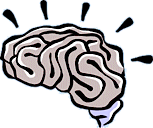
Depression is a terrible thing.
Whilst many of us may not understand it, I’m sure we all know someone who suffers from it. In fact, I’ve seen reports that show more than one in 20 Americans over age 12 suffer from depression, with higher rates among women, blacks and baby boomers aged 40 to 59.
It is of course much more than someone’s inability to accept his or her circumstances – there is a biological reason. Studies have shown a link between the likes of depression and bipolar disorder with the size of one particular region in the brain, the hippocampus, and this has been the focus of recent research.
The size of this key area of the brain involved in memory and mood disorders is influenced by variation in a growth factor gene that influences blood vessel growth and has been widely studied in heart disease and cancer.
A recent magnetic resonance imaging brain scanning and genetics study is another piece of emerging evidence suggesting that vascular endothelial growth factor, or VEGF, may be crucial to mental health. And the variations in brain volume associated with the VEGF gene suggest a possible cause of cognitive symptoms reported by some patients using anti-VEGF therapies for cancer and other diseases.
So how does this work? VEGF promotes blood vessel growth - a process called angiogenesis. The growth factor has been a favorite target for scientists seeking to starve cancer tumors of their blood supply. Other scientists have been interested in activating VEGF to help repair damaged hearts. Now it appears that this growth factor may also be crucial for the development and repair of the hippocampus, an area of the brain where memory is consolidated and which has been implicated in mood disorders such as depression and in dementias such as Alzheimer's disease.

Yale University researchers have been at the forefront of the hunt for genes that stimulate the growth of new neurons, a process called neurogenesis, in the hippocampus. The field was jumpstarted when it was noted in 2000 that anti-depressants triggered the creation of new cells in the hippocampus.
Last year they found that in addition to its role in stimulating blood vessel growth, VEGF is an essential mediator of neurogenesis of new brain cells. Other researchers have been examining genetic variations in VEGF in humans. One group did DNA tests on 47 healthy individuals to assess genetic variations in VEGF and conducted brain-imaging scans of the subjects to examine how these genetic variations might influence the structure of the brain. They found that the volume of hippocampus was significantly related to variations in the VEGF gene in their subjects.
The antidepressant drugs currently available target monoamines in the brain. The treatments inhibit the degradation of chemicals such as serotonin, dopamine and norephinephrine, which help control mood. Such drugs do not yet specifically target VEGF but it is possible that VEGF might act as a mediator of their antidepressant effects.
So the next step will be to further investigate the brain circuitry involved in mood disorders and clarify its relationship to VEGF.
The bottom line though is that it appears promising that studying VEGF could allow scientists to better understand brain function and develop better therapies for depression.
But in the meantime, what can we do to slow down brain shrinkage? Several recent studies have shown the importance of brain volume and also indicated that shrinkage may occur at the rate of 2 per cent a decade. Unfortunately, drinking alcohol has been found in some studies to cause this brain shrinkage.
So don’t let the current financial crisis stress you enough to raise or even maintain your drinking habits.
As we have clearly demonstrated in our past blogs, nutrition, supplements, mental exercise and intellectual stimulation are the key lifestyle attributes to adopt. Take the time now to introduce a program to keep your mind sharp.
Let us know how you’re doing and what aspects you’ve found helpful.
- The BrainReady Team




